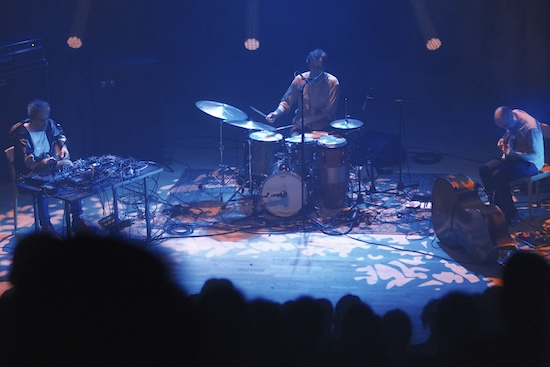Photo credit: Joeri Thiry
In his book The Exhausted of the Earth: Politics in a Burning World, Ajay Singh Chaudhary calls for us to embrace “The Long Now” to arrest environmental devastation. Rather than looking to a distant horizon, action needs to be taken in response to the world as it is. Chaudhary advocates finding time to look around rather than along a straight line between progress and decline. A lateral view of history and the day-to-day: “It’s not inventing the future so much as it is building the present,” he writes.
Chaudhary calls for action through grasping the weight of the moment, the different rhythms and stories happening now. The interventions that can be made in the present instead of holding out hope for far off technological miracles or despairing at inevitable apocalypses. “This is the geometry of The Long Now which, we see, is not splayed out on an imaginary coordinate lane but rather in biomes, in built worlds, in systems, in our niche.”
Ghosted II, the second album by the trio of Oren Ambarchi, Johan Berthling and Andreas Werliin, is music for The Long Now. They hold onto the present, make it tangible – almost tactile. While there are no explicit environmental themes in the record’s four tracks, it evokes the temporalities Chaudhary describes. More so than their first album, Ghosted II’s improvised instrumentals – equal parts jazz fusion and minimalism – move with lateral rather than forward motion. They produce a headspace akin to the intricate grids of Goat (JP) or Kukangendai, but the edges are wobbly and in flux. Recorded live with a few overdubs added later, the trio’s jams evolve outwards, inwards and sidewards rather than rushing between A and B. They stick within tight confines but never resort to moving in cycles. Their music is repetitive while never fully repeating. Similar frames persist, but they’re containers for variation rather than consistency.
The album commences in medias res, first track ‘en’ starting with Werliin’s hi-hats and cymbals already at full pelt. Ambarchi’s guitar is immediately thrumming and flaring. Berthling’s bass steps in a few seconds later, as though he’s been looking at the scene unfolding and considering his first move. He chooses a pulsing riff that sets regular time and gives the others something to work upon. Werliin’s percussion proliferates, extra surfaces get hit, smaller intervals start to get sounded and explored. He holds the beat but never nestles into neat patterns, dancing around rather than on the ‘one’. Ambarchi’s guitar stays within narrow harmonic confines, but texturally it’s capricious, perennially warping. As time moves around the piece extra textures enter the mesh. Berthling’s unflinching bass keeps the pulse, but around that things keep shifting. Like the lateral view suggested by Chaudhary, the moment gets expanded and coloured in. Seconds are still seconds. Minutes are still minutes. But they’ve become vaster containers.
Recorded in the same studio in Stockholm where they hastily tracked Ghosted I, the arc of the new record unbuckles the tension and torsion accumulated on the first. While ‘en’ picks up where Ghosted I left off, the later tracks slacken into a more tranquil zone. On ‘två’, the bass plays a pattern of harmonics equally evoking Jaco Pastorious’ ‘Portrait of Tracy’ and The Necks’ warm austerity. Underneath, percussion shuffles and eddies. Held guitar tones are corralled into panels of organ-like warble. Towards the end, Ambarchi holds a tail of feedback, gently flicking its volume up and down, a miniscule fixation in a different temporality to the rhythm section’s serene dance.
‘Tre’ has a levitating bassline whose melody and tone would sound at home on Alice Coltrane’s Journey in Satchidananda. Drums skip through to add extra directions of travel. Ambarchi’s guitar trips into an uncharacteristically celestial zone that initially sounds like a group of flutes before evolving into aeolian harp flurries. This mood continues into closer ‘fyra’. Ambarchi opens with a set of angelic arpeggios which blur into a trembling canopy. The gentle beginning nudges Werliin into his busiest, least gridded drumming on the record, feverishly rolling and skipping across the drum skins. Though operating in a more sedate mood, the trio pull a similar trick to what أحمد [Ahmed] manage at their most liberatory. There’s a feeling that as Ambarchi, Berthling and Werliin pull into different timeframes they’re perilously close to breaking apart. But as they balance on this precipice, a portal opens up. What could collapse instead stretches out, time slows down, and they chart a terrain ripe with potential.
Chaudhary suggests that grasping the reality of environmental decline is, at least in part, defined through the lens of temporality. We’re not really heading towards a universal species ending calamity. Climate change strikes unevenly, and so does urgency. We’re not all in it together. Some people will be hit much worse and much sooner than others. The privileged will be shielded from the worst effects by fortresses of private security and insurance. Anticipating apocalyptic events overlooks the fact that for some, they’re already here.
Ambarchi, Berthling and Werliin don’t make ecological collapse audible. But they do change the way we feel time. Ghosted II stretches the now. For every second of forward momentum there’s an ocean of lateral movement. The trio’s jams are texturally lush and rhythmically intricate, dazzling in the balance and harmony between the three players. They play with time as much as sound. It’s a captivating relationship musically, where separate temporalities congeal into a whole. Perhaps it can chime with ways of thinking about much bigger concerns.


